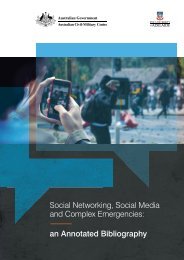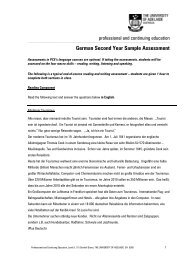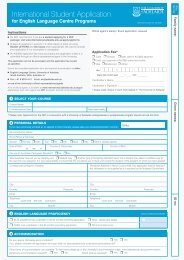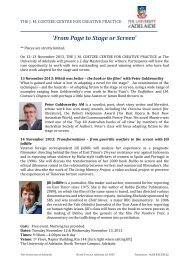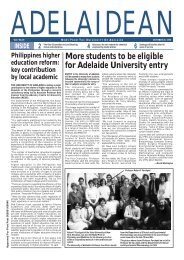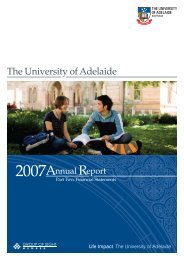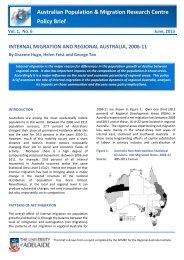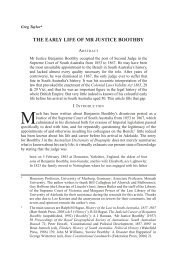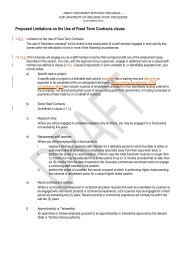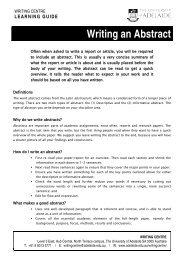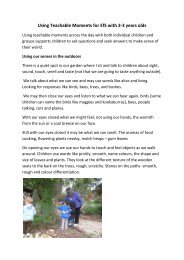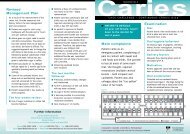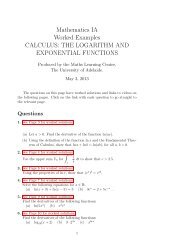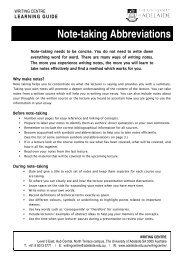Unbridling the Tongues of Women - The University of Adelaide
Unbridling the Tongues of Women - The University of Adelaide
Unbridling the Tongues of Women - The University of Adelaide
Create successful ePaper yourself
Turn your PDF publications into a flip-book with our unique Google optimized e-Paper software.
<strong>The</strong> New Woman <strong>of</strong> South Australia: Grand Old Woman <strong>of</strong> Australia<br />
<strong>of</strong> <strong>the</strong> New England <strong>Women</strong>’s Club, and with a number <strong>of</strong> women writers. 15 Even if<br />
she had not been sympa<strong>the</strong>tic to its concerns, she could not have avoided being impressed<br />
with <strong>the</strong> strength and variety <strong>of</strong> <strong>the</strong> <strong>Women</strong>’s Movement in North America.<br />
Ca<strong>the</strong>rine Spence was, though, far from unsympa<strong>the</strong>tic. She had, like Charlotte<br />
Perkins Gilman (who was more than a generation younger), deliberately chosen<br />
to try to make her living independently, and was <strong>the</strong>refore familiar with anxieties<br />
about where <strong>the</strong> next week’s housekeeping expenses were to come from. She had responded<br />
to such worries with a passionate and carefully reasoned outburst against a<br />
gender-divided labour market in her third novel, Mr Hogarth’s Will. She had lived at<br />
<strong>the</strong> centre <strong>of</strong> a predominantly female household, bringing up children and forming<br />
strong views – views to be found more widely spread in <strong>the</strong> kindergarten movement<br />
towards <strong>the</strong> end <strong>of</strong> <strong>the</strong> 19 th century than among <strong>the</strong> shapers <strong>of</strong> educational policy<br />
in South Australia in <strong>the</strong> 1870s – about ways <strong>of</strong> cultivating independence <strong>of</strong> mind<br />
and self-reliance in children. She had, like Barbara Leigh Smith and her friends in<br />
England, argued for and given warm support to <strong>the</strong> development <strong>of</strong> advanced education<br />
for young women. For some years, by 1893, she had been trespassing out <strong>of</strong><br />
<strong>the</strong> domestic sphere <strong>of</strong> hearth and home, not only into <strong>the</strong> realm <strong>of</strong> voluntary welfare<br />
work, like that <strong>of</strong> <strong>the</strong> South Australian Boarding-Out Society or like Rosamond<br />
Davenport Hill’s with <strong>the</strong> London School Board or Jane Addams’s work at Hull<br />
House. She had cautiously built herself a firm and favourable reputation as a writer<br />
for <strong>the</strong> daily press, and had more recently achieved fame as a persuasive speaker in<br />
<strong>the</strong> public sphere.<br />
Moreover, Spence was ready to help o<strong>the</strong>r women achieve similar goals. Charlotte<br />
Perkins Gilman remembered, more than thirty years later, a ‘strong, liberalminded<br />
woman, Miss Ca<strong>the</strong>rine Spence <strong>of</strong> Scotland [sic]’, who took Gilman’s first<br />
published book with her to England. <strong>The</strong>re Spence left <strong>the</strong> volume <strong>of</strong> satirical verses<br />
with a publisher who later brought out <strong>the</strong> edition which founded Gilman’s transatlantic<br />
reputation. 16 Campaigners like Susan B. Anthony were bound to meet Ca<strong>the</strong>rine<br />
Spence with delight, for not only could she tell <strong>of</strong> having met such pioneers <strong>of</strong><br />
suffrage campaigns in England as Barbara Leigh Smith, Rosamond Davenport Hill<br />
and Frances Power Cobbe, but she could also boast <strong>of</strong> an active <strong>Women</strong>’s Movement<br />
in South Australia, proclaim her own credentials as vice-president <strong>of</strong> <strong>the</strong> South Australian<br />
<strong>Women</strong>’s Suffrage League, and bring tidings <strong>of</strong> an optimistic struggle <strong>the</strong>re<br />
for <strong>the</strong> vote. She gave ‘fourteen paid lectures chiefly for <strong>Women</strong>’s Clubs’ during her<br />
time in North America, speaking on ‘Equal Suffrage mostly’, 17 and found when she<br />
143



